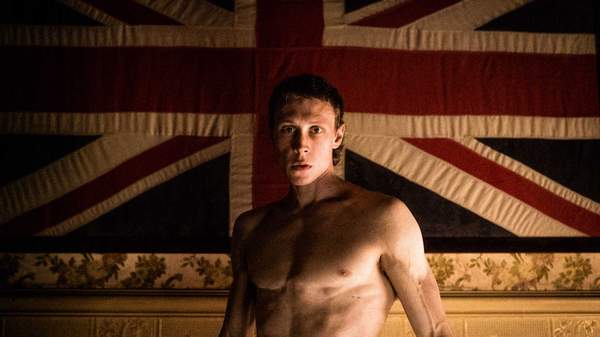Overview
UPDATE, September 24, 2020: True History of the Kelly Gang is available to stream via Neon.
Parched bushland. Roaring flames. Irate Australians rebelling against the status quo. It's a tragic coincidence rather than a case of making a purposeful statement, but True History of the Kelly Gang's bold, blazing imagery is timelier than director Justin Kurzel could've ever dreamed. It fits, though. It fits perfectly. Adapting Peter Carey's Booker Prize-winning novel via a sharp script by Kurzel's Snowtown screenwriter Shaun Grant, this a work of agitation. Made for a world where 'such is life' tattoos commit Ned Kelly's purported last words to slabs of Aussie flesh, this gritty, galvanising film sets fire to Australia's national identity and stares at the ashes of the country's troubled history — all by re-interrogating a man inescapably engrained in our iconography over the past century and a half.
Australia came of age in thrall to Kelly, with the notorious bushranger's Robin Hood-esque story known by everyone. Accordingly, True History of the Kelly Gang needn't wonder what type of nation evolves as a result, because that's the Australia that we already live in. But what has the country mythologised about Kelly, and why — and what does that say about us today? They're questions that Kurzel, Grant and a first-rate cast led by soaring British talent George MacKay (1917) all ponder. Carey's literary work doesn't just excavate the past but toys and tinkers with it, mixing reality and fiction to mirror the present — a task that this wild and daring feature eagerly continues.
"Nothing you are about to see is true," True History of the Kelly Gang announces at the outset. Reflecting the film's irreverent, impudent vibe, that's not strictly accurate. But the opening statement sets a playful mood and smashes any expectations of historical accuracy — because, here, anything can happen. So it is that Kurzel begins by peering through a letterbox-style slit in corrugated iron, as pre-teen Ned (excellent newcomer Orlando Schwerdt) watches his mother Ellen (Essie Davis) pay off local Sergeant O'Neil (Charlie Hunnam) by getting intimate. As lensed by cinematographer Ari Wegner (In Fabric, Lady Macbeth), shots recalling Kelly's famous armour keep recurring, peeking through gaps and offering rich and potent visual symbolism.
In his boyhood, Ned adores yet also fears his Irish settler mum, who'll do anything for her family — including putting her husband Red (Ben Corbett) in his place. The Kelly patriarch is considered a disappointment by his wife, with Ned dubbed the man of the house instead. Indeed, Ellen has plans for her eldest son. When, through an act of heroism, Ned receives the chance to attend boarding school, his mother refuses. Rather, she gives him to bushranger Harry Power (Russell Crowe) as an apprentice. Learning he's been sold into a life of crime severely shapes Ned's perspective, understandably.
Returning home a decade later following a stint in jail, Ned (now played by MacKay) makes a living through bare-knuckle boxing. He fights to entertain the law — such as the suspiciously friendly Constable Fitzpatrick (Nicholas Hoult) — and the upper classes, in a winking inversion of his future path. But his now-grown younger brother Dan (Earl Cave, son of Nick) has taken to horse-rustling, and soon crime is a family business. As their father previously did, they wreak havoc in the bush adorned in dresses, breaking both the law and societal conventions.
Immortalised in the first feature-length movie ever made back in 1906, in a Mick Jagger-starring 1970 flick and with Heath Ledger donning the bandit's helmet in 2003, the nuts and bolts of Kelly's story have already been given the cinematic treatment — the Jerilderie letter, the Glenrowan siege and his 1880 hanging among them. While the same minutiae remains here, it's reshaped, reinterpreted and recontextualised, with Kurzel's uncompromising 2015 reworking of Macbeth the best reference point. Think equally ferocious and poetic imagery, an intensity bordering on operatic, a score that's both sparse and jittery, and an all-round punk-ish attitude. Framed through letters penned by Kelly, retelling an oft-told tale isn't True History of the Kelly Gang's main motivation, but rather re-evaluating the legend that's sprung up around him. In stripping bare the bushranger's story, Australia's colonial history and the nation we've become in the shadow of each, two other filmic frames of reference spring to mind: 2018's Sweet Country and 2019's The Nightingale.
Ignoring the misstep that was Assassin's Creed, Kurzel's adds True History of the Kelly Gang to a resume already marked by Snowtown and Macbeth — and what an audacious and propulsive trio they make. All three also boast spectacular casts, with MacKay brawny, angry, anarchic and simply brilliant to watch here. Although he's well-supported by the formidable Davis, sly Hoult and raucous Crowe, he's nothing short of electrifying in this brutal yet utterly bewitching picture. The verve and spark in his performance is the same blistering energy that Kurzel burns into every frame of the film — a visually, emotionally, thematically searing movie that strides across the screen like an outlaw, aptly.
